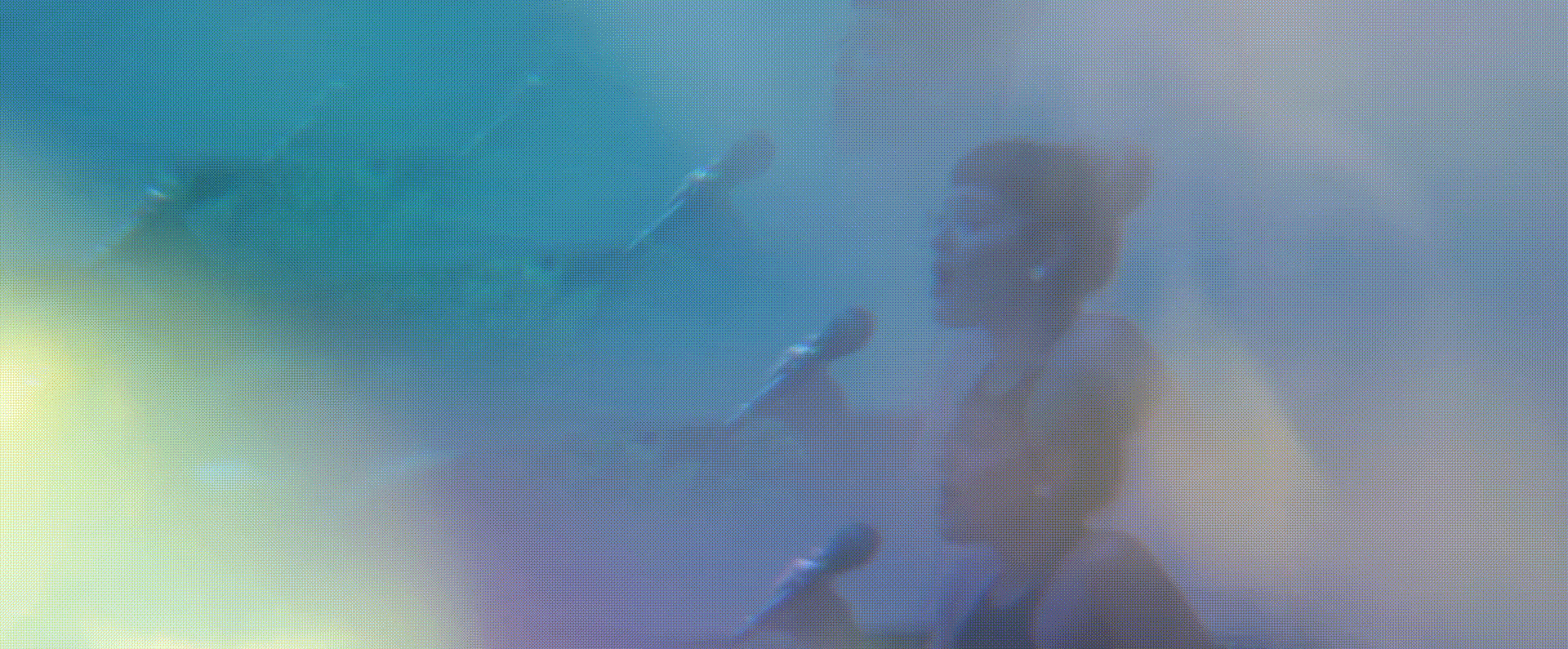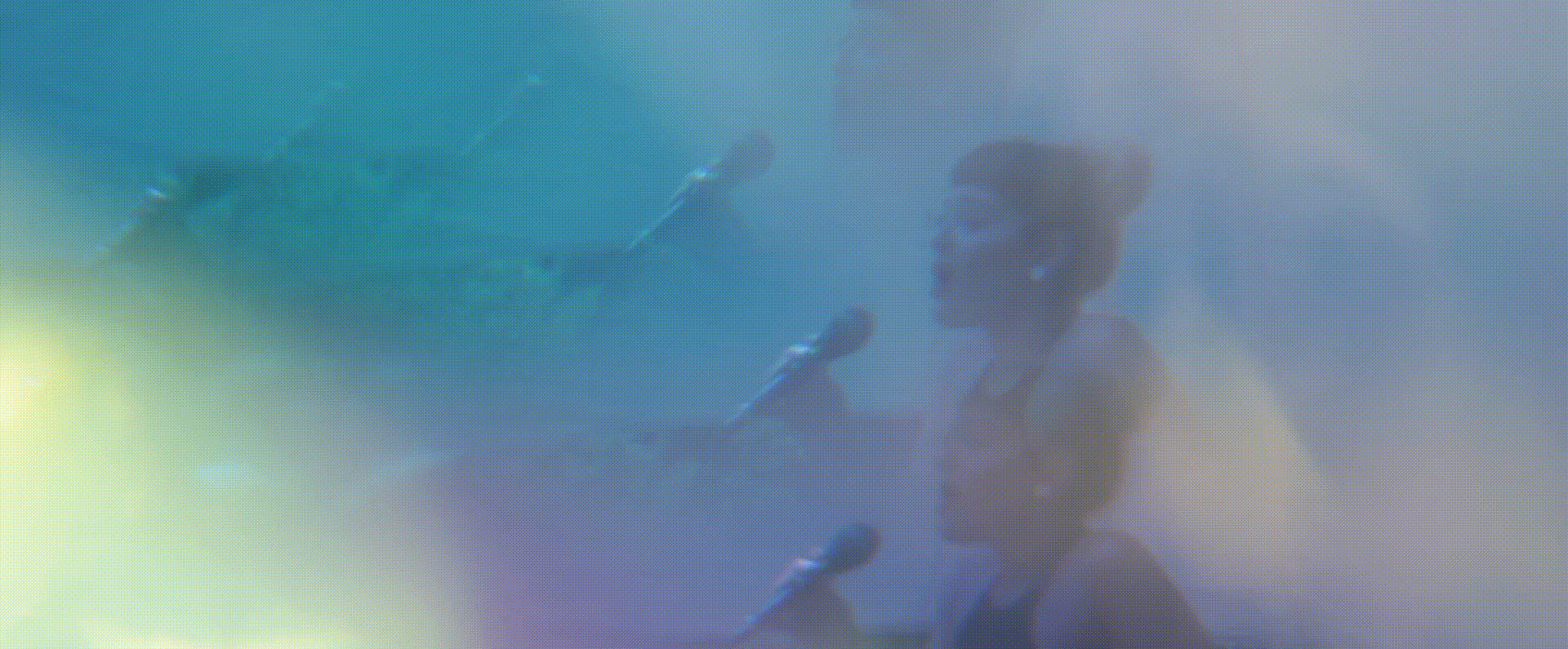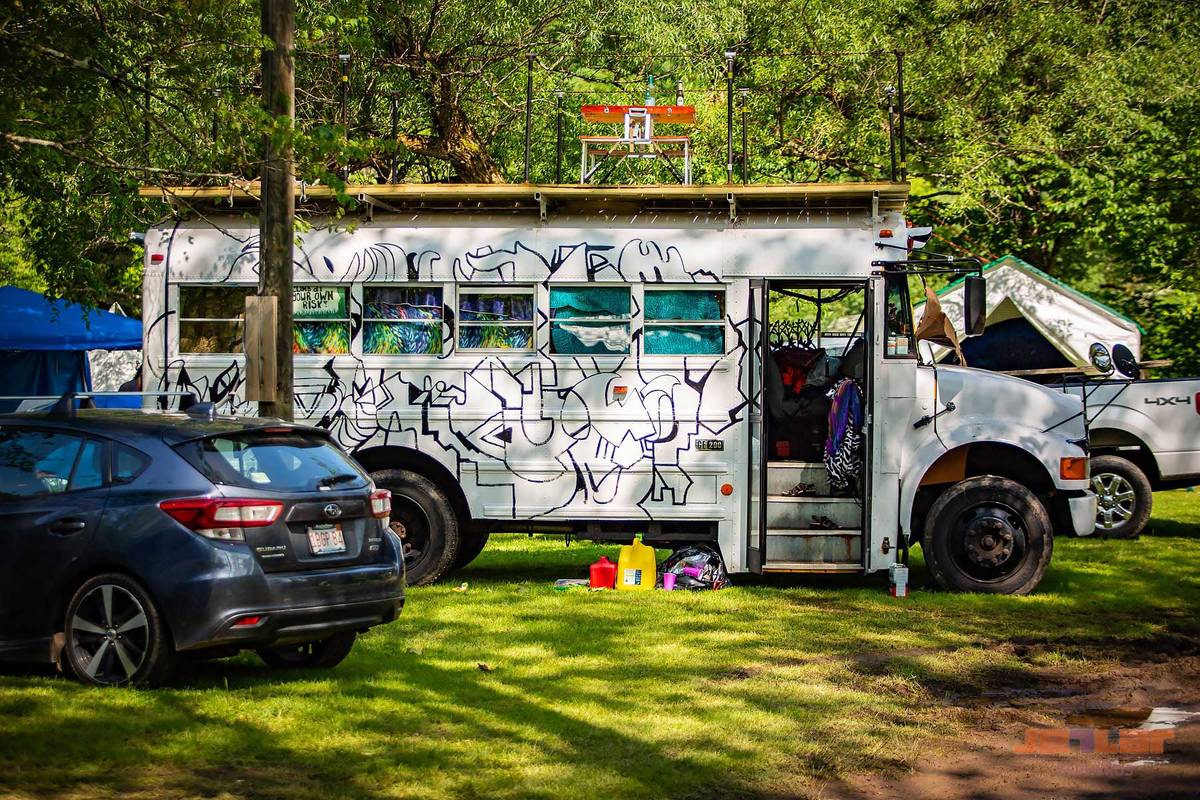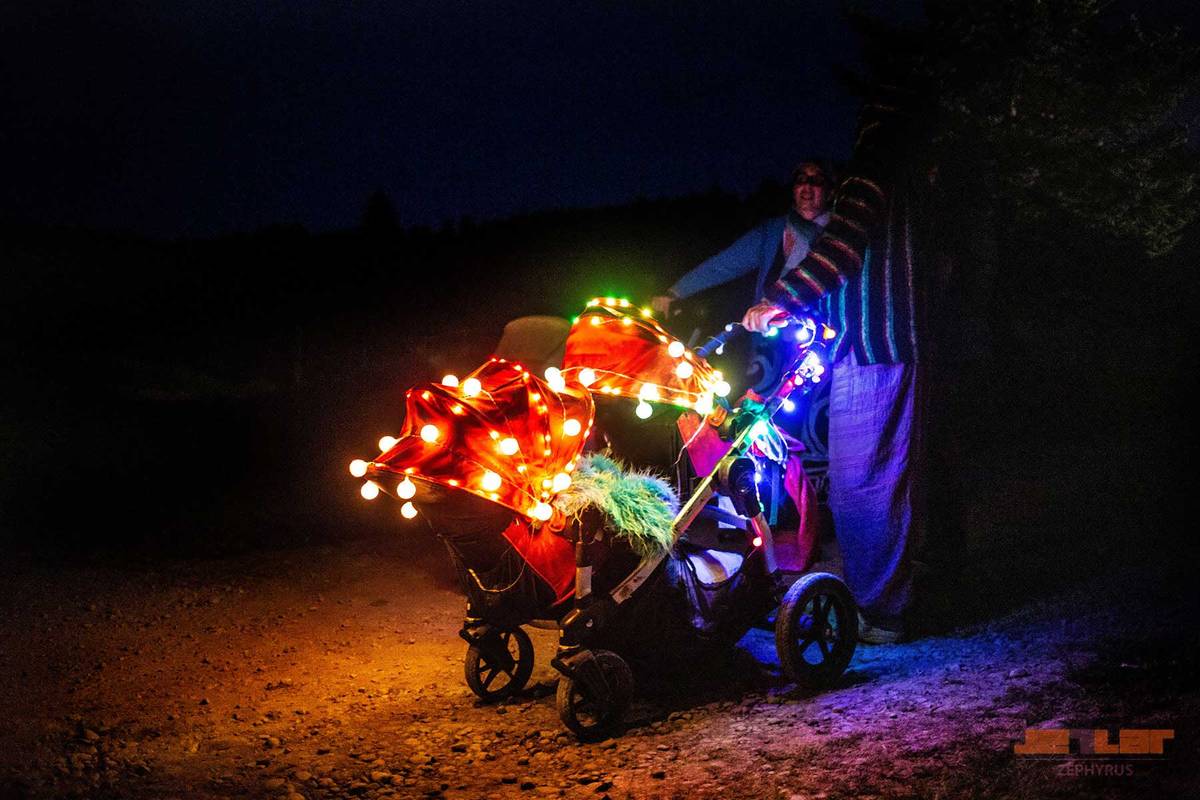Russian Jewish Burning Man
JetLAG, the largest open-air Russian music gathering in the United States, is an archipelago of post-Soviet affinity groups nestled on the banks of the Делавэр River in the Catskills




Every June, 2,000 Russian-speakers flock to the Catskill Mountains to take part in a weekend event that many liken to Burning Man, but without the dust and with significantly more vodka. Founded 11 years ago by a collective of Russian Jewish immigrants (namely the Feldman family, whose patriarch Jay “Gesha” Feldman died in 2016), JetLAG owes much of its creative spirit to the bounteous imagination of its creative director, Pavel Lion—known widely in the Russian-speaking diaspora by his stage name Psoy Korolenko. With his wizardly beard and wildly expressive eyes, Korolenko has been a fixture in the international Russian literati and Yiddish music scenes for the past decade, typically billed as an “avant-bard & wandering scholar” and carrying an encyclopedic knowledge of cultural references low and high, which often appear in his comical songs along with ample multilingual worldplay. By now, it’s safe to consider him JetLAG’s spirit animal.
And what of the name, JetLAG? Naturally, in true Korolenko fashion, it is an understated pun. Korolenko was in Moscow talking with JetLAG President Vicky Feldman by phone, he recalled: “We were experiencing jet lag,” he said—”time difference. And I was thinking, ‘Why don’t we call it something ‘camp,’ or rather something ‘lag,’” lager being the Russian word for camp. “And we immediately felt that this is sort of a bad pun, because it addresses gulags and others lags, which are bad—but ours is good. It’s a kind of lag that is full of love. And the thing is, JetLAG is a symbolic enough name because it’s about overcoming distances, geographical and spiritual.”
Hence the JetLAG tagline, a motto for its motley of discerning tastes: “You’ll find what you love, you’ll love what you find.”
From its humble beginnings as an offshoot of the East Coast Russian festival circuit, JetLAG has steadily grown into the largest open-air Russian music gathering in the United States. Its unique setup—three distinct and far-flung stages, strategically positioned along a mile-long strip of land skirting the Delaware River—lends itself to an extraordinary array of artistic expression.

The festival main stage features renowned acts from Russia and other former Soviet republics, most notably Leonid Fedorov, frontman of the legendary Russian alt-rock outfit Auktyon and a festival staple. Then there’s the Spell-Art stage, inspired by Korolenko’s trademark phrase and suggestive of all that is transcultural, whimsical, and bewitching: singer-songwriters, poet-bards, and various offbeat curiosities (last year’s Spell-Art featured a drag show of 1960s-era Soviet hits; this year’s featured London-based Yiddish songstress Polina Shepherd and a poetry reading by the Russian writer Dmitry Bykov). Finally, there’s PANGEA, which, as its name suggests, has a bit of everything: local indie and folk bands, shoegaze, dub, EDM, and a potpourri of other genres.
JetLAG HQ is stationed at the Feldman household, quietly tucked away in the suburbs of New Jersey. I arrived there on a Saturday morning in the midst of festival preparations, which Vicky (ironically?) referred to as a “subbotnik”: a day of compulsory volunteer service that was mandated by the Soviets (not to be confused with the Russian sect of Judaized Christians of the same name). Here, a dozen teens and 20-somethings were dutifully plugging away at various festival tasks: constructing art installations, arranging for artist hospitality, Skyping with vendors, testing equipment—after 11 years of subbotniks, it was a well-oiled machine. “Everybody in our house right now,” said Alice Feldman, daughter of JetLAG founders Jay and Vicky. “These are people that are unpaid, that aren’t in our family, that out of their own will spend their entire year working on this fest free of charge. Why? Because they came to JetLAG as attendees and decided ‘I want to be a part of this.’”
JetLAG was a family affair from its very inception. After Jay’s passing, Vicky took on his role as festival president—no small feat while working full-time to support a family. Fortunately, she was never lacking help. The festival enlists the service of 100-plus volunteers every year, the vast majority of whom are immigrants or children of immigrants. “It’s literally raising a village from the ground,” said Alice. “These kids are building this thing for all of their parents and grandparents and random other people to enjoy for one weekend.”
Naturally the volunteers gravitate toward PANGEA. “Most of the volunteers are kids of adults who live on the other side of JetLAG, over by the main stage,” said a volunteer named Nikita, a friend of the Feldmans. “But they’re not as interested in that style of [Russian bard] music, that style of traditional camping. They wanted an avenue to express themselves and be a part of something still in the confines of the Russian community, but totally different, totally new.” So PANGEA was established to fill that need.
PANGEA functions somewhat like a self-contained festival nested within JetLAG, attracting millennials, Gen Z, and older Russian burner types who prefer the new age aesthetic of tea ceremonies and drum circles to the alcohol-fueled jam sessions that erupt closer to the main stage. While PANGEA caters to festivalgoers who might also be psychonauts and lovers of electronica, other islands within the JetLAG archipelago of affinity groups are more embracing of avtorskaya pesnya, or “author-song”—a music tradition that emerged out of the 1960s Soviet bard counterculture (Vladimir Vysotsky being the most famous example).
PANGEA is managed by Alice, veritable heir to the JetLAG throne, if there is such a thing. Swathed in colorful fabric, radiating mystical energy and effortless cool, Alice has brushed shoulders with Russian rock royalty from a young age (she and the rest of the Feldman clan accompanied Korolenko to the Grammys earlier this year, when Yiddish Glory—a collaboration between Korolenko and scholar Anna Shternshis, based on discoveries from Kiev’s Vernadsky library’s Beregovsky archives—received a nomination for best world music album).
Alice was just 15 when JetLAG was born and grew up alongside the fest, assuming a leadership role very early on. According to her, PANGEA’s eclectic lineup is all but intentional. “Most of the PANGEA bands are non-Russian,” she said. “Our goal with the PANGEA experiment is to create an open, safe, friendly and totally creative organism where people can come to JetLAG and have absolutely nothing to do with its history, to open their eyes to new experiences.”
Transcending personal biases in the spirit of openness and diversity was part of the JetLAG mission from its very onset. “We wanted to make this event more about good music and vibes, which go beyond the diasporic, generational, or cultural,” said Korolenko. “Taste systems are also social strata bias systems, because music tastes are very much markers of who you are. … JetLAG was created to unite all people, not necessarily even Russian or immigrant. It felt from the very start as a breakthrough, as some explosion that explodes [cultural] biases, gaps, prejudices, expectations, stigmas.”
Under Korolenko’s inclusive ethos, JetLAG became the only Russian open-air festival in the United States to include klezmer and Yiddish acts in its lineup. To date, they have featured some of the biggest names in contemporary klezmer and Yiddish music, including Frank London of the Klezmatics, 2015 NEA Heritage Fellow Michael Alpert, Daniel Kahn and the Painted Bird, and many others, drawing a small contingency of Yiddishists every year. Daniel Kahn, whose Yiddish version of Leonard Cohen’s “Hallelujah” went viral in 2017, captured JetLAG audiences two years ago with his English rendition of songs by Bulat Okudzhava, the beloved Soviet bard of Georgian Armenian ancestry.

JetLAG’s Jewish soul reveals itself in more subtle ways as well. According to Korolenko, the Soviet folk tradition of avtorskaya pesnya (author-song) did for Soviet Jews what klezmer did for American Jews during the folk revival of the 1970s, functioning as a (covert) means of Jewish expression. “Even if not in Yiddish, even if not Jewishly themed, it had some vibe of marginality, of being both vernacular and alien, svoj i chuzhoj, this balancing at the border—this is very Jewish,” Korolenko said. Both Russian and Yiddish traditions “are accepted as part of our mutual shared heritage; our internationalist, universalist, transcultural heritage,” he added. “It’s very Jewish, because the Jew is an eternal wanderer, and very Soviet, because the Soviet agenda was internationalism; and this is certainly very American, because America is the country of immigrants and multilingual experience. So this is how JetLAG became American and Russian and like, meta-Soviet—only in a good way, never in a bad way.”
I’ve been to a fair share of gatherings since my college years, always feeling like a bit of an anomaly with my American name and accent. But it was easy to find a niche within its broad spectrum of post-Soviet subcultures, although I’m not an immigrant myself: I’m first generation; my parents came under refugee status in the 1970s and I was born in the United States. This was my fifth JetLAG and second as a featured performer. This year, I sang at PANGEA with Kvasova Band, the solo project of Russian folk singer/dancer Valentina Kvasova billed as “ancient Slavic singing traditions reimagined for contemporary soundscapes.” If you’re familiar with Ukrainian ethno-chaos quartet DakhaBrakha, that’s sort of the vibe we’re going for—picture polyphonic village songs with synths, hand drums, and psychedelic imagery.
Kvasova comes from a family of professional Cossack folk musicians in the Russian city of Rostov-on-Don (she is the realest of deals; her father was artistic director of the State Ensemble of Don Cossacks and People’s Artist of the USSR). I started learning folk songs from her last fall, and invited my Latvian-born accordionist friend Ilya Shneyveys to join us shortly after. Ilya is a bona fide klezmer, having played with some of the biggest names in the scene (he even briefly experienced internet fame as a member of the Russian klezmer outfit Dobranotch when their Yiddish parody of Rammstein’s “Du Hast” went viral).
The morning of the festival, Kvasova and I pulled up to Shneyveys’ house with full gear in tow: guitars, hand drums, handpan, shakers, pan flutes, (literal) bells and whistles. Shneyveys and his wife, Sarah, a cantor, slid onto the backseat and off we drove—a Cossack, a klezmer, a cantor, and myself, on our merry way to Russian Burning Man. It could have been the setup of a joke, or anekdot, as we say. One hopes that our ancestors would laugh.
Kvasova Band kicked off JetLAG on Friday night drenched in the twilight of PANGEA stage. My contribution to the set list was a Western Ukrainian ditty about a young lady driving all the boys (Mykolai, Bohdan, Ivan, Andrii, etc.) wild with her coquettish ways. We sang a couple Cossack tunes, which Shneyveys masterfully festooned with klezmer ornamentations. The next day, we had a hearty jam session featuring Odessan criminal songs, Romani romances, Soviet movie musical numbers, and even a few Yiddish songs including the anarchist anthem “In Ale Gasn,” belted out by a handful of 20-somethings. The sky was clear, the air was fresh, the chai was sweet, and the vodka cold as ice. It was an all-around epic time. As they say at JetLAG: You’ll find what you love, you’ll love what you find. And if you don’t find it, rest assured it will find you.
Samantha Shokin is a writer and musician based in Brooklyn.